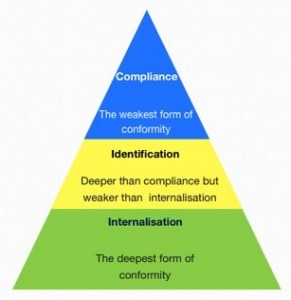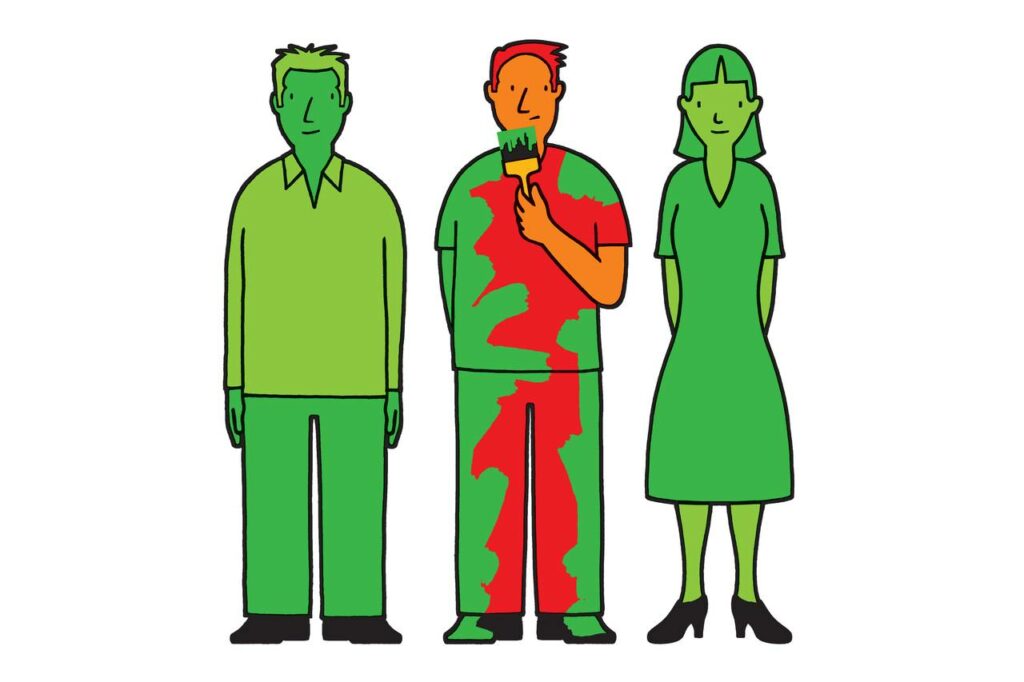Imagine a world where everyone is the same. This would be considered conformity, and it has been linked to negative outcomes in many different ways. People who are conformists have less self-esteem, experience higher levels of anxiety, and are more likely to suffer from depression. But what if there was another way? What if people were able to break out of their shells and live life on their own terms? That is exactly what this article will explore!
Contents
What is Conformity?

Conformity is “the act of matching attitudes, beliefs, and behaviors to group norms”. It changes people’s perception of the world around them. Conformity is one of the most studied social influence processes because it has both positive and negative real-world applications. For example, there could be times when conforming to the norm is good. Or it could result in bad things like the Holocaust.
Types Of Conformity

There are three types of conformity: informational, normative, and obligatory.
Informational Conformity
Informational conformity occurs when people conform to the actions or opinions of others because they want to gain accurate information. For example, you might ask your friends if they like a new restaurant before deciding whether or not to go there. You are using informational conformity in this case to gain knowledge that will help you make an intelligent decision.
Normative Conformity
Normative conformity occurs when people conform because they want acceptance from their peers. For example, if I went out for ice cream with friends and everyone else ordered chocolate, even though I like vanilla better, I might also order chocolate.
Obligatory Conformity
Obligatory conformity occurs when people conform because feel obligated to do so. If you get audited by the IRS and want to know what to do, ask your friends who have been through it too. You might want to ask your parents for help if you are applying to college. Obligatory conformity is also sometimes referred to as “situational conformity”.
Why Do We Conform?
There are a number of reasons why people conform, and some of these reasons are more obvious than others.
- One reason that people conform is that they want to fit in and be accepted by others. This is especially true for teenagers and young adults, who are often eager to fit in with their peers.
- Another reason that people conform is that they want to avoid being ostracized or rejected by others. In a sense, people conform in order to protect their social standing or status.
- Finally, people may conform because they believe that it is the right thing to do or because they want to be seen as good people. This can be especially true in religious or moral contexts, where people may conform simply because they think that it is the right thing to do.
How Does Conformity Influences Behavior?

The need to belong is a fundamental human need. It drives us to conform to the expectations of those around us. We want to fit in and feel accepted. This desire to conform can influence our behavior in both positive and negative ways.
In some cases, conformity can lead to positive outcomes. For example, when everyone in a group is working towards a common goal, conformity can lead to greater productivity. When everyone is following the same rules, it can lead to a more orderly and cohesive society.
However, there are also negative consequences of conformity. In some cases, people may conform to bad behaviors or ideas simply because they want to fit in. This can lead to mob behavior and the spread of questionable ideas.
Conformity and Obedience
Having a need to belong can influence how comfortable we feel in dissenting from the norm. Social psychologists refer to this as our “need for affiliation”. This need motivates us to conform to those around us, particularly people who are similar to us. We’re more likely to stick to the status quo when we see others around us sticking to it.
Of course, this need for affiliation also influences how we behave in groups and how we respond to rules and authority figures. Social psychologists refer to our tendency to obey authority as “obedience.” As with conformity, there are both positive and negative consequences of obedience. On one hand, following the orders of a competent authority figure can lead to successful outcomes. On the other hand, blindly following orders can lead to terrible atrocities.
In a classic social psychology experiment from the 1960s, researchers looked at both conformity and obedience. They wanted to see how people would respond when placed in a group situation with an authority figure who instructed them to engage in questionable behavior.
When can conformity be good for society?

Conformity is often seen as a negative attribute of human behavior and many people confuse conformity and obedience. When we speak about conformity, we don’t mean that you replicate or imitate others regardless of your own preferences or interests. Conforming means – instead – that you adjust your own attitudes, beliefs, and behaviors to match those around you, particularly in important or highly visible situations. There are times when conformity is not only acceptable but also desirable for the smooth functioning of society.
One situation in which conformity can be advantageous is when it comes to voting behavior. In a study, people were more likely to conform with the opinions of others when they were unsure about what to do. This happened when the person in question was seen as an authority figure or had a lot of power.
In another study, this time conducted by the University of Amsterdam, it was found that people are more likely to conform to the opinions of their peers when the group is unanimous in its opinion. This was especially true when the group was seen as being high in status.
Conclusion
Conformity is a natural human instinct. We all want to fit in the group of our peers, which is why we do what the others around us are doing even if it may not seem right for us individually. This social norm can have some negative consequences when people conform without considering their own values or beliefs. For example, conformity can lead to peer pressure that causes adolescents to experiment with drugs at an early age because they feel like everyone else does these things too.
You must talk openly with your children about your family’s values. Since they might get a temptation of drugs or alcohol, you need to tell them what you want them to do. By being honest with them, you are giving them the tools they need to make good decisions even when pressure is high.
If you are looking for affordable Online Counseling MantraCare can help: Book a trial therapy session


